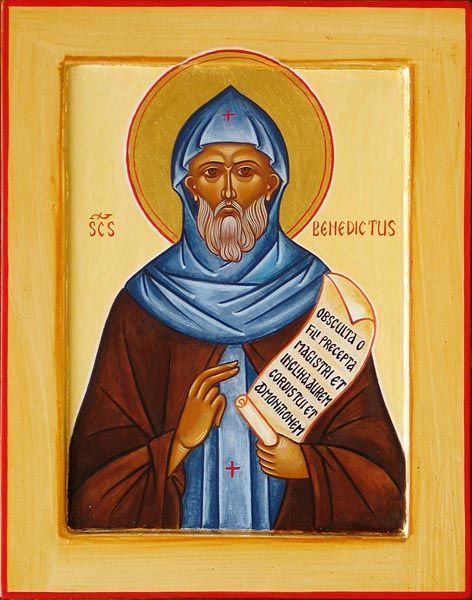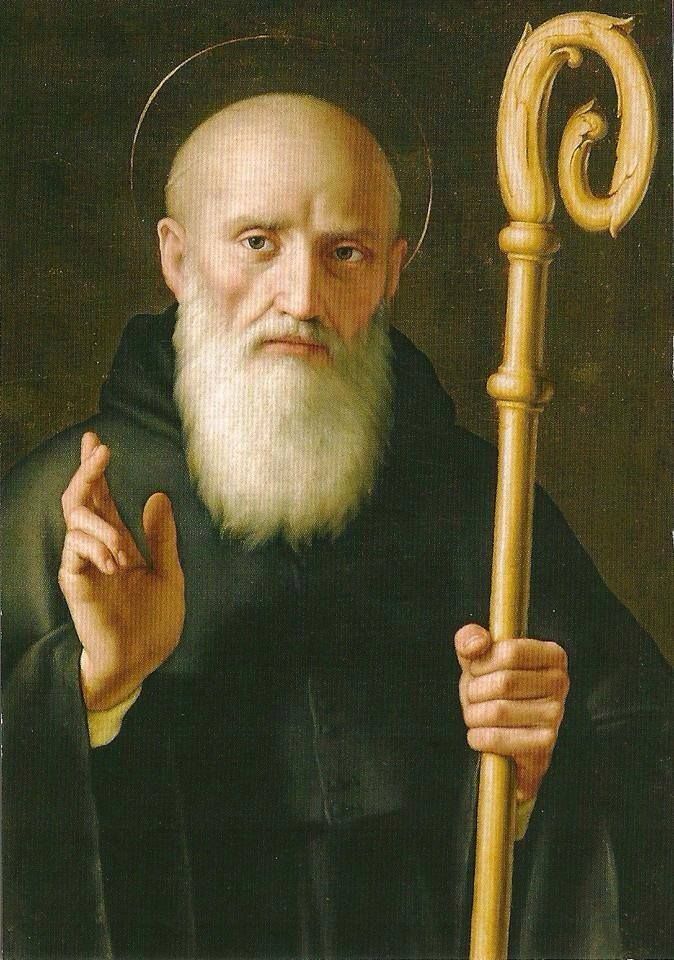Message of Abbot Paul - Tuesday 12th September 2023
Abbot Paul • September 11, 2023


Sadly, I had no time yesterday to write a message for today, so I thought that, for a change, you might like to read a conference I gave before Vespers to our novices, on the occasion of their Third Perseverance, a simple rite that takes place towards the end of the novitiate. Obviously, it’s also intended for the community as well as for oblates and friends. You might find it interesting and helpful. Give it a try!
This afternoon, you are making your Third Perseverance, which means that you are now three quarters of the way through your novitiate. St Benedict tells us in Chapter 58 that the Rule that should be read through at least four times in the course of the novitiate, and by that he means studied thoroughly, and even memorized by the novice. It is, after all, the monastic rule that describes the life you will live for the rest of your days. Each day at Chapter you will hear it read and each day will be a kind of judgement day when you face God, the community and your own conscience and have to answer the question: am I living by the Rule or not? And the Rule, as you know, is based on Scripture, the Word of God, not simply a text but Christ himself, the Way and the Truth and the Life, whom we try to follow in patience, humility and obedience, Christ’s own way to which he has called us, saying “Follow me.” Guided by the teaching of the Novice Master and the example of your elders, you are learning to follow “Christ, the true King,” “clothed with faith and the performance of good works, with the Gospel for your guide, so that you may deserve to see him, who has called you to his kingdom.”
The Rule, as you have discovered, is a deceptively simple, compact document, little more than the length of a short story, yet it is profound and complex at the same time. St Benedict was a practical man, methodical and full of common sense. He was searching not only for God but also for what was best for his monks. By that I do not mean that he took short cuts or chose easy options, not at all, but that he always put people first, not the system or the method or the organization. He wrote a Rule that would help his monks achieve their goal, “that perfect love which casts out all fear,” that is, love for God, love for their brethren and all men and women and love for themselves. The weak were not to be discouraged because the going was too hard or the strong give up and go elsewhere because there was nothing worthwhile to aim for. Think of such examples as the brother who can’t settle down to read, he should be given some useful work to do instead, or take the brother who can’t eat what is set before him, he should be offered something else.
When it comes to prayer, the whole purpose of monastic observance is to develop the art of continuous prayer. No form of prayer is to be difficult or tedious. See how St Benedict legislates for the Divine Office. It might seem excessive to us today. Here I would say that I honestly think that less taken calmly and prayerfully is infinitely better than a lot at breakneck speed, which is how it was before. Compare St Benedict’s to other early rules, or the practice of the canons in the Roman basilicas, and you have an office that is short, austere and manageable, even in a small community. Why does he shorten the office? In order that monks might have enough time to rest at night and that they might have sufficient time for work and reading during the day. The Rule of St Benedict is the first monastic rule to take work seriously and to make sure that monks have enough time to do a good day’s work. “They are truly monks who live by the labour of their hands.” Notice, for example, how he moves the offices round to make time for work and how he takes for granted that monks will be working in the fields or elsewhere, necessitating their reciting the offices as best they can wherever they happen to be.
At the beginning of Chapter 19 he writes, “We believe that the Divine Presence is everywhere…. But beyond the least doubt, we should believe this to be especially true when we celebrate the divine office.” And in Chapter 20 he tells us that we are to pray “with the utmost humility and sincere devotion.” Remember that for St Benedict humility means mature self-awareness, knowing and acknowledging who and what we are in the presence of God and of our brethren. Prayer is that fundamental Christian and monastic practice that cultivates mindfulness of the Divine Presence and all prayer centres on the Scriptures, the Word of God. For St Benedict the Bible is the source and context of a monk’s prayer, whether he prays alone or in community. But for St Benedict, as for ourselves, the Word of God is not a book but a person, Christ, the Incarnate Word of God, who speaks to us in the Scriptures, in the Sacraments (the Word in action), in our personal prayer and in our Lectio, in the Divine Office, in our brethren, especially the sick, in the abbot, in our guests, in the poor, in our work, in nature and in the whole of creation, which is God’s gift to us. Through the grace and indwelling of the Holy Spirit, all these aspects of our prayer life come together in the person of Christ on whom we are centred and focussed. God alone can bring about that gift of continuous prayer for which we long. And what is continuous prayer but to be mindful of the Divine Presence at every moment of our lives, even when we are tempted to sin, even when we fall. What greater spiritual experience can there be than repentance and forgiveness?
Now St Benedict says little about non-liturgical prayer, yet we are told in Chapter 52 that monks can make use of the oratory for private or personal prayer. “Simply go in and pray, not in a loud voice, but with tears and with heartfelt devotion.” Personal prayer for St Benedict is always associated with tears. In Chapter 49, on the Observance of Lent, we are invited to “devote ourselves to prayer with tears, to reading, to compunction of heart and self-denial.” The desert fathers often referred to tears as the “bread of monastic life”, thus indicating their importance and normality. What is compunction but the deep-seated humility of the repentant sinner as he grows in ever-deeper awareness of his own sinfulness as well as in compassion for the sins of others? In repentance and forgiveness, the tears of sorrow are mingled with those of joy. The pricking of the heart results in bleeding, which is paralleled to the waters of Baptism that cleanse and heal. So, prayer with tears purifies the heart and prepares us to see God. “Blessed are the pure in heart for they shall see God.” Purity of heart, tears of compunction and the intention of our heart all go together and are God’s gift to us if we but open our hearts to him and wholly give ourselves to him in the monastic life.
Dear Br Meinrad and Br Gildas, our prayer for you this evening is that this gift of continuous prayer be ever more yours as you persevere in the monastic life. That you have persevered thus far is a good sign that God loves you and wants only what is best for you.
I hope that gives you a little insight into our way of life and Benedictine spirituality. I hope to get back to normal tomorrow.









